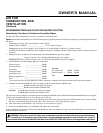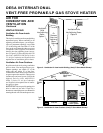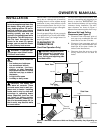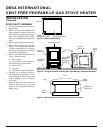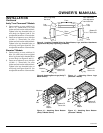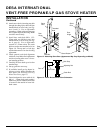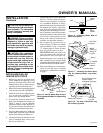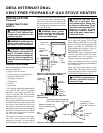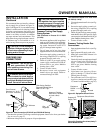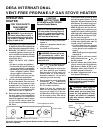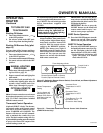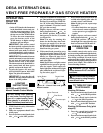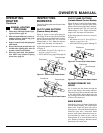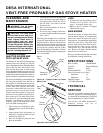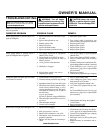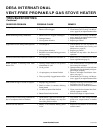
13
104462
OWNER’S MANUAL
O
N
POSI
T
O
PO
S
Tee
Joint
Pipe
Nipple
Cap
3" Minimum
Sediment
Trap
Gas
Regulator
From External
Regulator (11" W.C.**
to 14" W.C. Pressure)
CSA Design-Certified
Equipment Shutoff Valve
With 1/8" NPT Tap*
Approved Flexible
Gas Hose (if allowed
by local codes)
Figure 22 - Gas Connection (SVYD18P and FSVYD18P Series)
* Purchase the optional CSA design-certified equipment shutoff valve from your dealer.
See Accessories, page 33.
**Minimum inlet pressure for purpose of input adjustment.
CAUTION: Avoid damage to
regulator. Hold gas regulator with
wrench when connecting it to gas
piping and/or fittings.
We recommend that you install a sediment
trap in supply line as shown in Figure 21,
page 12 and Figure 22. Locate sediment trap
where it is within reach for cleaning. Install
in piping system between fuel supply and
heater. Locate sediment trap where trapped
matter is not likely to freeze. A sediment
trap traps moisture and contaminants. This
keeps them from going into heater controls.
If sediment trap is not installed or is in-
stalled wrong, heater may not run properly.
INSTALLATION
Continued
WARNING: Never use an open
flame to check for a leak. Apply a
noncorrosive leak detection fluid
to all joints. Bubbles forming show
a leak. Correct all leaks at once.
WARNING: Test all gas pip-
ing and connections for leaks
after installing or servicing. Cor-
rect all leaks at once.
CHECKING GAS
CONNECTIONS
Pressure Testing Gas Supply
Piping System
Test Pressures In Excess Of 1/2 PSIG
(3.5 kPa)
1. Disconnect appliance with its appliance
main gas valve (control valve) and equip-
ment shutoff valve from gas supply pip-
ing system. Pressures in excess of 1/2
psig will damage heater regulator.
2. Cap off open end of gas pipe where
equipment shutoff valve was connected.
3. Pressurize supply piping system by ei-
ther using compressed air or opening
propane/LP supply tank valve.
4. Check all joints of gas supply piping
system. Apply a noncorrosive leak de-
tection fluid to gas joints. Bubbles
forming show a leak.
5. Correct all leaks at once.
6. Reconnect heater and equipment
shutoff valve to gas supply. Check re-
connected fittings for leaks.
Test Pressures Equal To or Less Than
1/2 PSIG (3.5 kPa)
1. Close equipment shutoff valve (see Fig-
ure 23).
2. Pressurize supply piping system by ei-
ther using compressed air or opening
propane/LP supply tank valve.
3. Check all joints from gas meter to equip-
ment shutoff valve (see Figure 24). Apply
a noncorrosive leak detection fluid to gas
joints. Bubbles forming show a leak.
4. Correct all leaks at once.
Pressure Testing Heater Gas
Connections
1. Open equipment shutoff valve (see Fig-
ure 23).
2. Open propane/LP supply tank valve.
3. Make sure control knob of heater is in
the OFF position.
4. Check all joints from equipment shutoff
valve to control valve (see Figure 24).
Apply a noncorrosive leak detection
fluid to gas joints. Bubbles forming
show a leak.
5. Correct all leaks at once.
6. Light heater (see Operating Heater,
pages 14 through 17). Check all other
internal joints for leaks.
7. Turn off heater (see To Turn Off Gas to
Appliance, remote-ready models, page
15, manual-variable models, page 16).
Figure 23- Equipment Shutoff Valve
Closed
Equipment
Shutoff
Valve
Open
Figure 24 - Checking Gas Joints (Amity™
Stove Model Shown)
Control Valve
Location
Propane/LP
Supply Tank
Equipment Shutoff Valve
CAUTION: Make sure exter-
nal regulator has been installed
between propane/LP supply and
heater. See guidelines under
Con-
necting to Gas Supply
, page 12.



